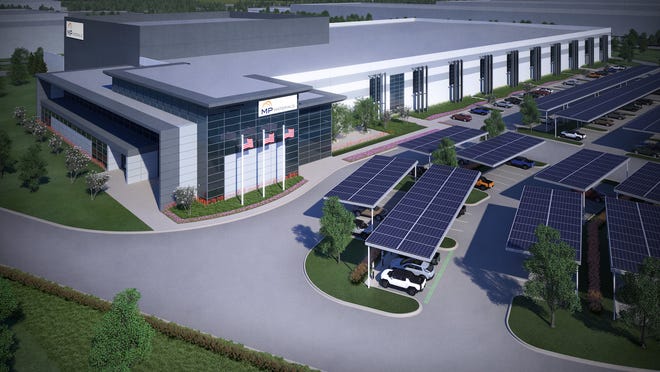General Motors announced Thursday two new partnerships with manufacturers of raw materials used in electric vehicles that it says will increase its cost efficiency, be environmentally sustainable and create jobs.
As part of those partnerships, GM said its new partners will each build a new factory in the United States — one in Fort Worth, Texas, and the other location yet to be announced, with production starting in 2023 and 2024.
It also means that the majority of GM’s Ultium platform, the battery system that will power its EVs, will be sourced, processed or manufactured in North America by 2025, said Shilpan Amin, GM vice president of Global Purchasing and Supply Chain.
More:Michigan lawmakers, Whitmer fast-tracking incentive plan aimed at electric vehicle plants
“We are building a resilient and sustainable EV manufacturing value chain in North America from raw materials to components to drive GM’s growth and support a mass market for EVs,” Amin said Thursday.
The new deals
The first agreement is with rare earth mining and manufacturer MP Materials based in Las Vegas.
GM said it has signed a binding agreement on terms and expects to enter into a definitive supply agreement shortly with MP Materials to develop a U.S. supply chain for rare earth magnets.
MP Materials will supply U.S.-sourced and manufactured alloy and finished magnets for the electric motors used in the 2022 GMC Hummer EV pickup, 2023 Cadillac Lyriq EV SUV, Chevrolet Silverado EV pickup and more than a dozen electric vehicles that will have GM’s Ultium Platform. MP Materials’ production will start in 2023.

GM will not have an ownership stake in MP Materials, Amin said, but rather a traditional supplier agreement. He declined to provide the financial details.
But MP Materials said in a statement that its new plant in Texas will be a 200,000-square-foot facility that will create more than 100 skilled jobs. The facility will produce alloy and magnets to power nearly 500,000 EV motors a year.
GM also announced it has a nonbinding memorandum of understanding with German-based supplier VAC that GM expects to finalize early next year. VAC makes advanced magnetic materials. It will start making those magnets for GM in 2024.
GM will not have an ownership stake in VAC and Amin declined to disclose financial details saying they are still being finalized.
Magnets are an essential part of EV motors and drive units, GM spokesman David Caldwell said in an email. Forming partnerships for raw material sourcing secures GM’s supply chain for EVs and makes the materials more North American-focused.
“We have roughly 10 agreements with different suppliers making this happen,” Caldwell said. “Today, we’re adding two more such agreements.”
Magnets in EVs
This latest news follows an announcement last week that GM signed a “nonbinding term sheet” to create a joint venture with South Korea-based chemical maker POSCO Chemical.
GM and POSCO said they will build a new factory in North America by 2024 to process key battery materials used in GM’s Ultium electric vehicle platform. The location for that plant has not been announced, but that could happen in January. GM‘s current battery supplier, LG Chem, has a factory in Holland, Michigan, that could be expanded.
It is part of GM’s promise to launch more than 30 EVs globally by 2025 and invest $35 billion in electric vehicle and autonomous vehicle product development by 2025.
GM, which is building Ultium LLC battery plants in Ohio and Tennessee, has said it will build two more of those battery plants, but has not announced the locations.
GM and VAC will build a plant in the U.S. that will manufacture permanent magnets for the electric motors used in the 2022 Hummer EV, which is starting production at GM’s Factory ZERO in Detroit and Hamtramck now.

It will also supply the materials for the 2023 Cadillac Lyriq, which will be built at GM’s Spring Hill Assembly plant in Spring Hill, Tennessee. VAC will supply magnets for the Silverado EV pickup and many other models using GM’s Ultium Platform. GM said the new plant would plan to use locally sourced raw materials.
Magnets are key to an EV motor, which has an electric coil that generates a magnetic field to push against strong magnets, creating the torque that propels the car, GM said.
The Hummer EV has as many as three motors with up to 11,500 pound-feet of torque, allowing it to accelerate 0-60 mph in 3 seconds, GM said.
US-sourced raw materials
MP Materials will supply U.S.-sourced and manufactured rare earth materials for Neodymium-iron-boron (NdFeB) magnets, which are key to enabling electric motors to transform electricity into motion.
Amin said that although development of permanent magnets began in the U.S., there is virtually no domestic capacity to produce the NdFeB magnets today, so this collaboration will accelerate the restoration of the U.S. rare earth supply chain.
MP Materials owns and operates the Mountain Pass rare earth mine and processing facility in California, the only active and scaled rare earth production site in the country, Amin said.
Rare earth materials sourced from Mountain Pass will be transformed into metal, NdFeB alloy and magnets at a new plant that MP Materials will build in Fort Worth, Texas.
The partnerships are “another bold step forward that will help ensure that we meet our goal to lead the EV industry in North America in more than just sales,” Amin said.
More:GM’s self-driving subsidiary fires back at accusations it is violating laws
More:GM partners with The Moth to bring live storytelling to its employees
Contact Jamie L. LaReau: 313-222-2149 or jlareau@freepress.com. Follow her on Twitter @jlareauan. Read more on General Motors and sign up for our autos newsletter. Become a subscriber.